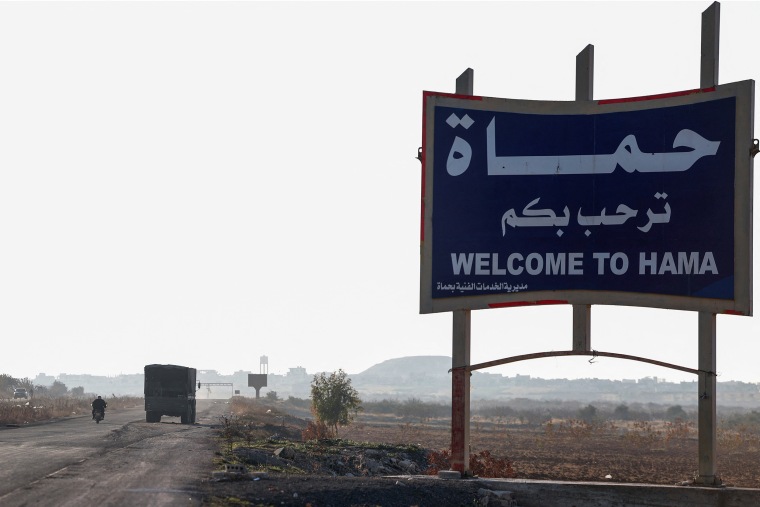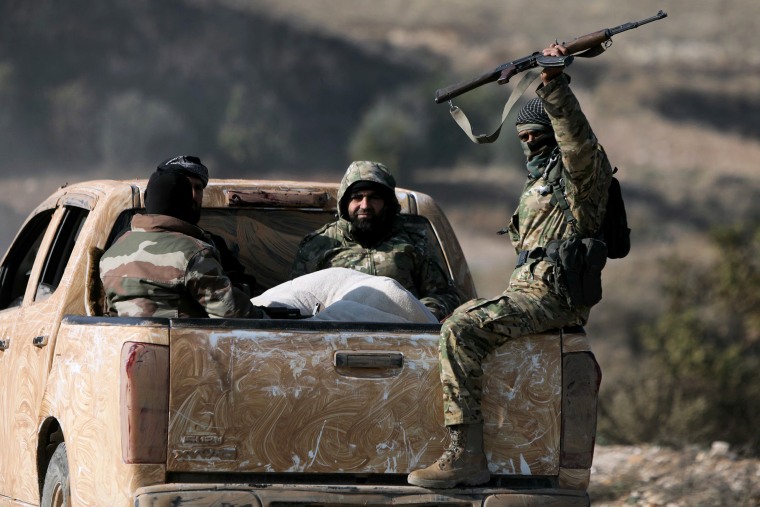Syrian rebel forces Wednesday were within 6 miles of the central city of Hama, a city freighted with past horrors for antigovernment forces.
Hama, Syria’s fourth-largest city, might represent an even more significant fillip than the sudden capture last week of Aleppo — the country’s most populous city — in the civil war's most significant offensive in years and one that could dramatically shift the balance of the country's conflict.
Even though the map of Syria has been repeatedly redrawn since 2011, Hama has never been in rebel hands. Insurgents and Turkey-backed fighters opposed to the government of Syrian President Bashar al-Assad were under 10 miles from the city, according to The Associated Press.
Lt. Col. Hassan Abdul-Ghani, a senior rebel commander, denied government claims that his fighters near the city had been repelled.

"We want to confirm that all the areas we have captured are still under our control, and progress is continuing," he said via WhatsApp.
NBC News was unable to confirm claims by either side because independent journalism is very difficult in Syria, owing to the rapid changes in territory held by different groups and repression by the official government.
Hama was the site of the Assad regime’s bloody crackdown on protesters in 2011 and the scene of widespread destruction in 1982. Tens of thousands of Sunni Muslims were killed there at the order of the current president’s father and predecessor, Hafez al-Assad.
While Syria’s civil war has raged for almost 14 years, it had dropped from the spotlight since 2020, when the war’s front lines became frozen.
That was before last week’s shock seizure of Aleppo in a push led by the militant group Hayat Tahrir al-Sham. Known as HTS, the militia grew out of a former Al Qaeda affiliate and is designated as a terrorist organization by the U.S., the United Nations and others.
The Assads are Alawite Muslims, as opposed to Sunni or Shiite — the religion’s two major branches — and they have long been fighting a patchwork of armed opposition groups seeking their overthrow. The war is estimated to have killed a half-million people since 2011.

For the survivors, the reignition of fighting has destroyed the fragile calm of recent years. “I won’t hide that we are scared,” said Mohammed Dalati, 23, an engineering student at Aleppo University, which has closed in recent days.
Dalati told NBC News that he didn’t want his neighborhood or the city where he lives to suffer the same fierce fighting as the Eastern Aleppo region did in 2016.
“It was completely destroyed and turned into a war zone, leaving its people displaced and their futures lost,” he said.
“I think the worst is yet to come,” he added. “If war breaks out, we don’t know where to escape.”
It’s difficult to overstate the role the battle for Hama will play in the immediate direction of Syria’s civil war, said Charles Lister, director of the Syria program at the Middle East Institute, a Washington-based think tank.
“Hama is the make-or-break point,” he said.
If rebels take the city, they will next turn to the central and strategically important city of Homs, which is more sympathetic to their cause.
But if the regime maintains control, he said, it will try to make the city a new front line from which to launch the type of heavy Russian-backed bombing campaigns targeting civilians and civilian infrastructure not seen since 2018.
Either way, “all of a sudden the regime looks humiliated but also profoundly weak and vulnerable in the sense that its allies haven’t been able to make the difference on the ground,” he said.
Russian foreign ministry spokesperson Maria Zakharova said Wednesday that the Assad regime has Moscow’s support in countering the attack by what she said were “terrorist groups.”
Russia and Iran accuse the U.S. and Israel of being among the forces backing insurgents.
Meanwhile, aid groups warned that some areas in northern Syria were already experiencing food shortages.
“The recent escalation in Syria threatens to drag the country back into the darkest days of this near 14-year conflict,” Angelita Caredda, the Norwegian Refugee Council’s Middle East and North Africa Regional Director said in a statement. “Civilian casualties are rising because of shelling and airstrikes, and thousands of families have been displaced.”
The role of Turkey in the Syrian civil war has been more complex. Its president, Recep Tayyip Erdoğan, long a backer of anti-Assad forces, said Tuesday that the Syrian government must engage “in a genuine political process” to prevent the situation there from further deteriorating, according to The Associated Press.
While Turkey has helped anti-Assad groups, it also opposes the U.S.-backed Kurdish-led coalition forces and has more recently worked with the Assad regime to jointly fight those Kurdish groups and to try to ensure the safe return to Syria of 3 million refugees.
As HTS-led fighting continued in Syria’s northern and central regions, Kurdish forces opened a new front in the northeast and were battling government soldiers in the northeast, both sides told Reuters.
With fighting looking likely to intensify in the coming days, it's Syria's civilians, such as Dalati, who are preparing for the long haul.
“We are waiting for the unknown,” he said.
CORRECTION (Dec. 7, 2024, 7:30 p.m. ET): A previous version of this article misstated the relationship of Hafez al-Assad to Syrian President Bashar al-Assad. He is the current president’s father, not brother.
